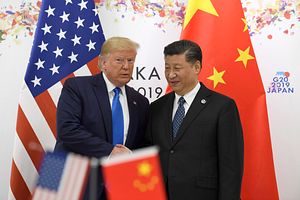The experts have spoken out on Trump’s China policy, and they aren’t pleased. In an open letter on July 3, many of America’s foremost Sinologists criticized the administration’s stance, saying it attempts to “treat China as an enemy and decouple it from the global economy” and is a “counterproductive effort to undermine and contain China’s engagement with the world.”
But U.S. Secretary of State Mike Pompeo has claimed that the policy simply recognizes “the competitive nature of the relationship between our two countries,” such that “as China has taken actions that have provided risk to the American people… each of those actions has been met with a strong and vigorous response from the United States of America.” U.S. Vice President Mike Pence echoes the National Security Strategy, insisting, “‘Competition does not always mean hostility,’ nor does it have to.” Who then is correct? Is U.S. policy antagonistic or simply competitive?
It is notable that the academics do not identify specific objectionable actions, preferring instead to offer their own policy recommendations. Although they believe China’s challenges “require a firm and effective U.S. response,” they say that “the current approach to China is fundamentally counterproductive.” They also claim China is not “an economic enemy or an existential national security threat that must be confronted in every sphere.” China, however, is challenging the world across many areas, from economic chicanery to military bullying. Apparently, the experts believe a “strong and vigorous” response will only exacerbate Beijing’s hostile behavior, recommending a “firm and effective” response instead.
To support their position, they claim that “Washington’s adversarial stance toward Beijing weakens the influence of [moderate] voices in favor of assertive nationalists.” What the scholars miss is that Xi has grabbed a great deal of power for himself over the past seven years. History suggests that lack of a vigorous U.S. response, far from strengthening moderates, will only vindicate Xi’s posturing. The good news is that Xi still lacks the bona fides of a Mao or a Deng and is thus vulnerable. The world may yet convince him to take more moderate positions, but that can only come about by pressuring him firmly.
U.S. actions to date have in fact been quite restrained. We can debate whether tariffs and public embarrassment are the best methods to nudge China, and we might agree that the threat of tariffs against allies and partners is unhelpful. But there is no reason why the world should allow China to pick and choose which parts of the equitable, prosperous international system to benefit from while undermining the rest.
And as we discuss actions in other areas, we should remember that China has also emerged as the premier human rights abuser of our century, as well as a major facilitator of human rights abuse. The world’s failure to respond to Xi’s 2014 oppression of Turkic minorities encouraged him to expand it into the program of concentration camps and other mass ethnic cleansing measures we see today. This is of course China’s crime, not America’s. But it should be abundantly clear that if we do not confront China with maximum firmness now, we will be forced to fight them with our entire strength in the future. On this front and many others, America has only begun to press China.
In attempting to carve out a position between competition and cooperation, the academics are seeking a spot between the ocean and the beach. Any milder form of pressure would simply be a return to the cooperative policies of yesteryear. Even the Obama administration put some pressure on China, for example by underwriting the Philippine’s UNCLOS tribunal suit against China. What it failed to do was to show real commitment to opposing China’s defections from the international system.
For too long, we have made excuses for China’s failure to follow the rules in hopes that cooperation and engagement would provide China the space and example it needed to become a responsible stakeholder. We must accept that this strategy has not succeeded. This is not to say that the United States has given up on engagement or no longer wishes China to become a supportive member of the international community. In most ways, the United States has not reduced cooperation with China (see for example here, p. 126), rather it is beginning to assume a competitive stance in response to the myriad ways in which China challenges it and the world.
I too was once a strong believer in a cooperative strategy with China. Working directly with the Beijing government in the intervening years, however, my experience has been that it no longer honors commitments without the threat of serious consequences. A microcosm of this truth is seen in China’s recent abuse of its foreign teachers, although analogous acts in other areas abound. We must accept reality: China’s actions under Xi have simply strayed too far from American and global norms not to mount a vigorous response.
Xi, however, is overplaying China’s hand. If China had waited until it was truly formidable, the world would have little choice but to put up with its unreasonable demands. But the Party selected Xi as a “dynamic” leader who would take risks to strengthen China. Our failure to respond to his challenges has encouraged him to take ever greater risks. He may yet reform his ways, both in China’s interest and his own. But that will only come from more pressure, not less.
The views expressed in this paper represent the personal views of the author and are not necessarily the views of the Department of Defense or of the Department of the Air Force.
































